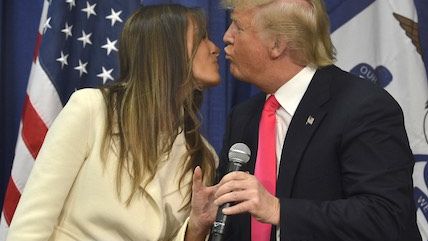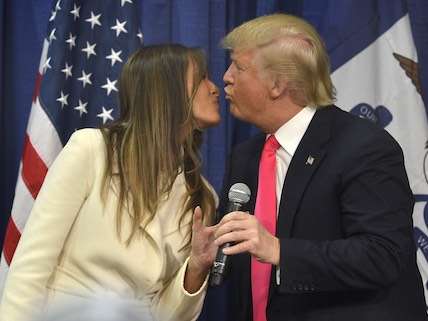Will President Trump Fire the College Sex Police? Q and A with Attorney Andrew Miltenberg
'We're holding college students to a much higher standard than we're holding the leader of the free world.'


The bizarre manner in which sexual assault disputes are investigated on college campuses could be overhauled now that Donald Trump has been elected president instead of Hillary Clinton.
Indeed, many victims' advocates are concerned that Trump's Education Department will roll back the Office for Civil Rights' enforcement of Title IX, which is largely responsible for the proliferation on campus kangaroo courts that deny fundamental due process to accused students. Know Your IX, an activist organization that aids student accusers, told Inside Higher Ed that the kind of reforms Trump is likely to make would be "disastrous and devastating" for students.
But the status quo is disastrous and devastating for students who are accused of sexual assault and harassment. The federal government has instructed university administrators to handle these cases themselves—to investigate wrongdoing and determine punishments—without recognizing students' basic rights. Accused persons are frequently denied legal representation, the right to confront their accusers, the ability to properly consider the evidence against them, and the right to an impartial jury.
But does Trump have any credibility to fix what's wrong with Title IX, given that the president-elect was accused of sexual harassment by a number of women?
Andrew Miltenberg is an attorney who specializes in campus sexual assault disputes. He has represented accused students in a number of high-profile cases—including Paul Nungesser, the Columbia University student accused of rape by "mattress girl" Emma Sulkowicz. He is also representing Grant Neal, who was expelled as a result of perhaps the most Kafka-esque Title IX investigation I have ever written about.
I talked with Miltenberg about how Trump's victory is likely to impact the campus rape debate. (This interview has been lightly edited for readability.)
Reason: I think a lot of people, myself included, expected Hillary Clinton to win the presidency and give us at least four more years of OCR and Title IX overreach. But what's going to happen now?
Miltenberg: It's interesting. One way it could go is there would be a clear and decisive message from the new administration to the OCR and the Department of Education that this type of overreach is no longer going to be in favor. And there's some irony to that, because the elected president was accused by many different people of the kind of behavior that the OCR seems very intent on going after, and that didn't seem to have an impact on the public as far as electing him. Which raises yet a different issue, which is you know if the public is going to forgo allegations of sexual misconduct in the president, it certainly would seem to me that the OCR has been overreaching. And at who's agenda, or at who's behest? Because the public, the American people, elected a president who under any type of measure by which the OCR is acting right now, he would been found responsible of sexual misconduct, sexual assault, and would have likely been expelled from the university.
Reason: You saw this irony with the Access Hollywood tapes. The person to whom Trump was making these inappropriate comments, Billy Bush, was forced to resign. Meanwhile Trump has been elected president.
Miltenberg: Not only has Billy Bush been forced out for—I don't know if you could call it—reporting what happened, but for being a conduit for understanding what happened. You know what, the irony is that the OCR, which is tasked with, or its mission is, to act on behalf of the Department of Education on behalf of the American people with respect to civil rights and civil rights issues within publicly funded universities, has not been representing the will or the spirit of the American people, as this election has made clear. Because if it were, presumably the president-elect wouldn't have gotten 50-plus million votes. So you have to wonder up until now, who's agenda was really being pushed at the OCR. To purport to act on behalf of the people of this country, and yet the people of this country don't seem to be particularly interested in this issue. Donald Trump certainly, were he on any college campus across the country, I have no doubt would have been expelled. You had multiple allegations of multiple infractions or violations. He certainly would have been found responsible for one or more of them by virtue of the preponderance of the evidence standard and the way I've seen it play out. And the sanction, because there would have been multiple allegations or complaints, would have been severe.
Reason: I suppose the counter-argument to that would be, well, what the American people think is one thing, what the law says with regard to campuses is another. But then the question becomes, is the law being interpreted correctly?
Miltenberg: And why we're holding college students to a much higher standard than we're holding the leader of the free world. College students who are in many cases inexperienced in the world, and alcohol is playing a role on colleges. If you took alcohol out of the equation, 90 percent of the cases I see would disappear. None of this is to say that there's not sexual misconduct on campus, and none of this means there shouldn't be a greater scrutiny, and this isn't an issue which needs heightened attention. What it does mean is we're holding college students to a much higher standard than we're holding the leader of the free world. The most powerful, single position in the entire world and you have actions by an adult male who was fairly unrepentant about it and I'm not talking as a political issue. And yet you have college students who at least in the cases I've seen almost uniformly say "oh my god I didn't realize she didn't want this" and at best it was unclear and they're being found responsible by virtue of pressure that the Department of Education is bringing to bear. So it seems ironic and yet incongruous that this is happening. And so the hope I guess, not that the OCR backs off completely, because again there is a need for heightened attention and scrutiny and diligence, not just on college campuses, but all over the country. At the same time the hope is maybe the preponderance of the evidence changes, or there is more transparency in the hearing process, or there are greater resources to someone being accused or there are more experienced investigators that are part of the process, and those things I think are doable and hopefully something this administration can change.
Reason: Let's talk about that a little bit. What are the most important reforms that you would liketo see? Perhaps a Trump administration could put out new guidance that says the university should use a higher evidence standard and that we have to have cross-examination. The current guidelines discourage cross-examination, but they don't outright say no to it.
Miltenberg: You know, I did a hearing last week in a New York school. It took about nine hours, there were 14 witnesses. There were a couple things wrong with it, so much so I had to take one of my blood pressure pills during. I'm not kidding, it made me crazy. So they allowed the complainant to make all sorts of outrageous statements. They allowed her to make statements like "I heard from so many of my friends that he's done this to other people." Things that in a real courtroom would compromise a jury, but here it didn't. You had three panel members who clearly had no experience in this area and quite frankly were unimpressive intellectually, and life-experience wise. I mean you wouldn't have wanted them critiquing your next article, let alone sitting in judgment of some serious charges. The report was thin and the investigator made a number of comments that there were, we thought, important witnesses that she didn't think she needed to talk to. The investigator acted essentially as an advocate for the complainant. So in this hearing last week, it was just about everything that was wrong with the Title IX hearings all at once. You had an inept investigator, you had three panel members who were inexperienced and unimpressive and young, you had a Title IX coordinator who was browbeating my client, and you had an unrestrained complainant who was saying things that were just, she was texting one of the witnesses during the hearing. I mean so, it was to me a monument to everything that's wrong with these hearings, and you know. They had time for 13 witnesses, but not time for one or two others that I thought may have given a context to the interaction. So there in lies what I think some of the reforms need to be. I hope that some of these reforms come about and that the evidentiary standard is changed.
The reality is if you sit in a dozen of these hearings you get a very compelling sense that if the allegations, why would the complainant lie? And the accused must have done something, or why else would we be here? It really exists like that, and forgive me for getting worked up, but I challenge any thinking person to come into one of these hearings that I've done dozens, not even two, several three, four dozen, over these past two years, and at literally everyone, with one or two exceptions, it's seems pre-ordained. It's almost like you missed the meeting before the meeting, everyone is that decided. It's a very kabuki theater like event.
The fear I have, and stop me if I rant too much about this, but schools, because there is such a backlash against the Trump election among different segments, and maybe rightly so, there is a backlash among young people, among women, among young men, in the lesbian and gay community, and my fear is that schools are going to sort of double down on the way they approach these cases. As if to say, look we're so unhappy with Donald Trump that we're going to hold firm to what we believe is right and disregard whatever his OCR may do.
Regardless of what side of this issue you're on, I think people can agree two things. One is that there are reforms needed, and two is that this topic, this issue, should be at the forefront. Young women shouldn't, and young men should not fear each other, or the sex police. And you have schools, and that's a whole other topic you can explore, which is that schools have become a de facto moral arbiter


Show Comments (55)